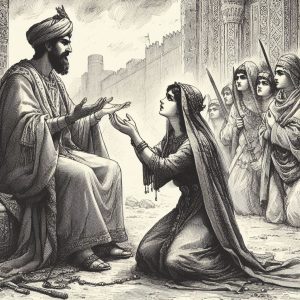
Zahhak (the prince replied) was a king who had growing from each of his shoulders a serpent requiring for its food every day the brain of a freshly slain youth. I have heard also that in his time there lived a woman named Hanbuiy.
One day the lot of ill-fortune fell upon her son, her husband and her brother and all three were seized to await the time when the customary cruelty should be practised upon them. The woman went to the palace of Zahhak, poured dust upon her head in token of the wrong she suffered and, wailing aloud in her agony, she said: ‘ It has been the custom daily to take but one man from a household. How comes it that to-day the demand is for three men from my house?’
The sound of her lamentation penetrated within the portico of Zahhak, who heard it and demanded the meaning of the occurrence. The circumstances were thereupon reported to him and he said: ‘Let her be given the choice of one of the three, who is to be set at liberty and restored to her.’
‘Hanbuiy’ was therefore brought to the gate of the prison-house. Her first glance fell upon her husband and a yearning for his society and companionship stirred within her being and a desire to be united with him throbbed in her breast. She was about to choose him, when she beheld her son. Almost would she have stretched out her hand against her own heart [lit. liver] and cast it in place of her son, her heart’s delight, into the claws of the eagle of calamity, in order to bring him out into safety. But then in a flash she saw her brother and was held in the same tight bonds. She bent her head and with the blood-stained tears of misery raining down upon her cheek she considered within herself.
‘I am plunged in the whirlpool of perplexity,’ she thought. ‘I do not know which to choose-the light of my eyes (my son), the comfort of my heart (my husband) or the adornment of my life-in order to bring peace to my disturbed heart. What am I to do? My heart will by no artifice of language permit me to break the link with my brother. I am still a young woman. I may be able once again to marry a husband from whom a son may come to help me quench the fire of separation with the water of union and counter the poison of this one’s death with the antidote of that one’s life; but it is impossible that from my father and mother, now both separated, another brother should come to me upon whom I may bestow my love.’
